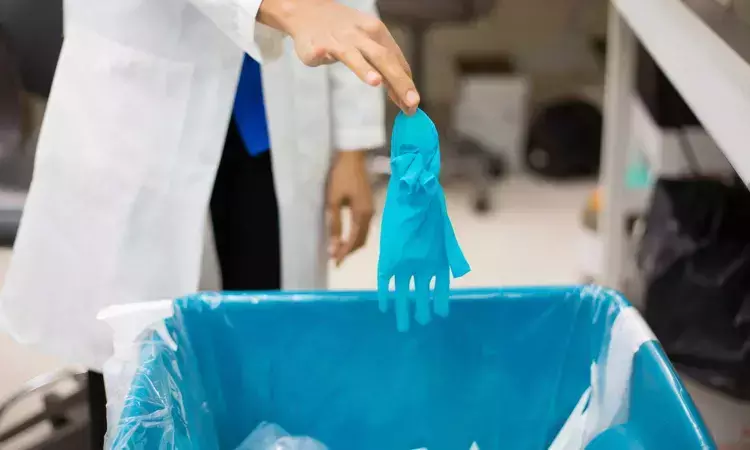- Home
- Medical news & Guidelines
- Anesthesiology
- Cardiology and CTVS
- Critical Care
- Dentistry
- Dermatology
- Diabetes and Endocrinology
- ENT
- Gastroenterology
- Medicine
- Nephrology
- Neurology
- Obstretics-Gynaecology
- Oncology
- Ophthalmology
- Orthopaedics
- Pediatrics-Neonatology
- Psychiatry
- Pulmonology
- Radiology
- Surgery
- Urology
- Laboratory Medicine
- Diet
- Nursing
- Paramedical
- Physiotherapy
- Health news
- Fact Check
- Bone Health Fact Check
- Brain Health Fact Check
- Cancer Related Fact Check
- Child Care Fact Check
- Dental and oral health fact check
- Diabetes and metabolic health fact check
- Diet and Nutrition Fact Check
- Eye and ENT Care Fact Check
- Fitness fact check
- Gut health fact check
- Heart health fact check
- Kidney health fact check
- Medical education fact check
- Men's health fact check
- Respiratory fact check
- Skin and hair care fact check
- Vaccine and Immunization fact check
- Women's health fact check
- AYUSH
- State News
- Andaman and Nicobar Islands
- Andhra Pradesh
- Arunachal Pradesh
- Assam
- Bihar
- Chandigarh
- Chattisgarh
- Dadra and Nagar Haveli
- Daman and Diu
- Delhi
- Goa
- Gujarat
- Haryana
- Himachal Pradesh
- Jammu & Kashmir
- Jharkhand
- Karnataka
- Kerala
- Ladakh
- Lakshadweep
- Madhya Pradesh
- Maharashtra
- Manipur
- Meghalaya
- Mizoram
- Nagaland
- Odisha
- Puducherry
- Punjab
- Rajasthan
- Sikkim
- Tamil Nadu
- Telangana
- Tripura
- Uttar Pradesh
- Uttrakhand
- West Bengal
- Medical Education
- Industry
CSIR-NIIST to Implement Biomedical Waste Treatment Technology at Delhi AIIMS

Delhi Government Plans Advanced Biomedical Waste Plants Across the City
Thiruvananthapuram: The All India Institute of Medical Sciences (AIIMS) is set to improve biomedical waste management with the launch of 'Srjanam', an automated conversion rig developed by the National Institute for Interdisciplinary Science and Technology (CSIR-NIIST) in Thiruvananthapuram.
Union Minister for Science and Technology Dr Jitendra Singh will formally launch an automated biomedical waste conversion rig that can disinfect pathogenic biomedical waste such as blood, urine, sputum, and laboratory disposables, without the use of costly and energy-intensive incinerators, besides imparting a pleasant fragrance to these foul-smelling toxic waste.
According to a UNI report, the rig, christened as “Sṛjanam” and developed by National Institute for Interdisciplinary Science and Technology( CSIR-NIIST) based at Thiruvananthapuram, will be installed and commissioned at a function at AIIMS, New Delhi on February 10.
The prototype equipment, with a daily capacity of 400 kg, can handle 10 kg degradable medical waste per day in the initial phase. The technology, once validated, will be ready for full-scale implementation after securing approval from competent authorities.
Also Read:Delhi AIIMS, Blockchain For Impact join hands to boost biomedical innovation
Through this technology, CSIR-NIIST aims at an innovative and alternative solution for the safe, inexpensive and environment-friendly disposal of pathogenic biomedical waste.
The event will be attended by Dr M Srinivas, Director, AIIMS New Delhi; Dr. (Mrs.) N Kalaiselvi, Secretary, DSIR & DG, CSIR; Tanmay Kumar, Secretary, MoEFCC; Dr Rajiv Bahl, Secretary, DHR & DG, ICMR; and Dr. V K Paul, Member, NITI Aayog.
Dr C Anandharamakrishnan, Director, CSIR-NIIST, will propose the vote of thanks.
The technology, developed by CSIR-NIIST, has been confirmed by expert third parties for its antimicrobial action and the non-toxic nature of the treated material. It can also disinfect laboratory disposables for direct recycling. Soil studies have confirmed that the treated biomedical waste is superior to organic fertilizers like vermicompost.
“With its potential to transform treated waste into value-added soil additives with minimal human intervention, our technology provides a safer solution for healthcare facilities, avoids the risk of spills and occupational exposure, and assists in preventing uncontrolled spread of infectious microbes,” said Dr. C Anandharamakrishnan.
India produces 743 tonnes of biomedical waste daily, according to the 2023 annual report of the Central Pollution Control Board (CPCB). It presents a significant challenge for proper management and disposal.
Improper segregation, open dumping, open burning, and inadequate incineration lead to severe health hazards, such as the release of harmful human carcinogens, particulate matter, and ash residues.
Increased biomedical waste generation demands more transportation facilities, increasing the risk of accidents and spills. The WHO has also emphasized the importance of innovative and alternative protocols for pathogenic biomedical waste disposal.
Dr C Anandharamakrishnan said the dumping of biomedical waste at any premise is prohibited by law. However, there have been several incidents of dumping the biomedical waste generated in one state across the borders of the neighbouring states, reports UNI.
Incineration is a costly energy-intensive strategy that forces the stakeholders to adopt simpler and cheaper, but sometimes illegal means, to dispose biomedical waste.
Also Read:Maharashtra: Private Hospitals to be charged for Biomedical Waste based on Number of Beds
Kajal Rajput joined Medical Dialogues as an Correspondent for the Latest Health News Section in 2019. She holds a Bachelor's degree in Arts from University of Delhi. She manly covers all the updates in health news, hospitals, doctors news, government policies and Health Ministry. She can be contacted at editorial@medicaldialogues.in Contact no. 011-43720751


